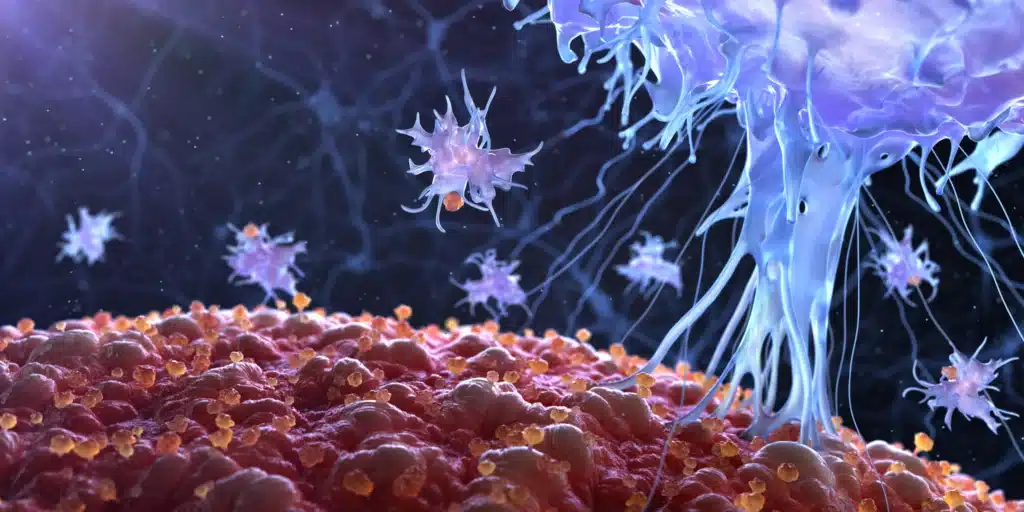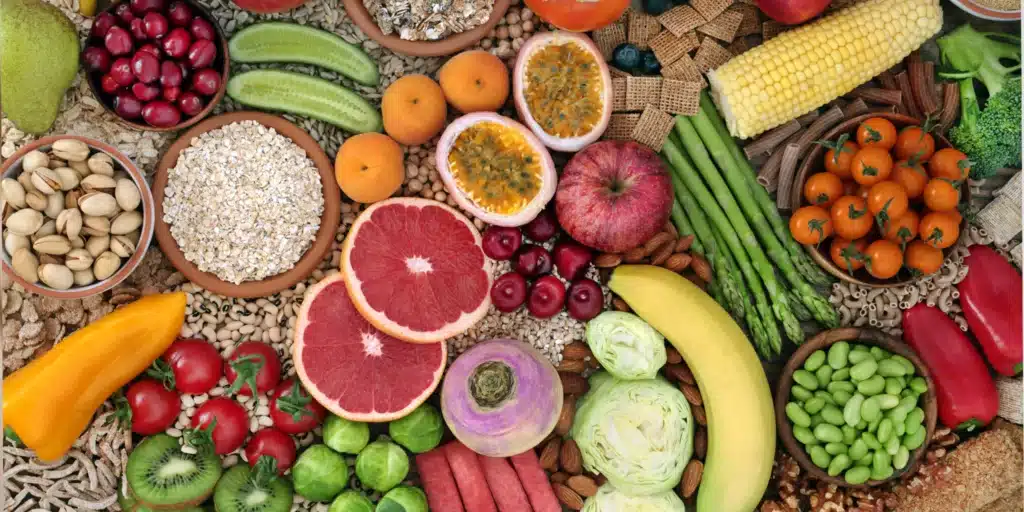|
Getting your Trinity Audio player ready...
|
Takeaways:
• Good gut health can reduce your risk of developing chronic diseases like diabetes, heart disease, and more.
• The gut microbiome helps keep your body and mind healthy.
• What you eat affects your gut health, and there are easy ways to improve your gut health.
• The Western, American diet leads to poor gut microbiome function and increases the risk of health problems.
What is the Gut Microbiome?
Your gut health is the cornerstone of your health overall. But why?
It has to do with the gut microbiome.
The gut microbiome refers to the 10-100 trillion bacteria living in your intestines. Many of these bacteria are incredibly helpful in our health journey. It has been discovered that a healthy gut microbiome can reduce the risk of:
• Diabetes
• Inflammatory Diseases
• Heart Disease
• Obesity
The reason for this is that the gut microbiome affects many of our body’s systems. Researchers have found that the microbiome can impact:
• Immune System Function
• Mental Health
• Production of Vitamins and Essential Neurochemicals
• Sleep Regulation
Working to have a healthy gut is especially important for those of us with chronic gut conditions like:
• SIBO (small intestinal bacterial overgrowth)
• GERD (gastroesophageal reflux disease)
• Celiac Disease
• Chron’s Disease
• IBS (irritable bowel syndrome)
Being able to ensure that your gut is healthy can limit the symptoms that come with these chronic gut conditions. But how can a healthy gut do that?
How Does Gut Health Affect Our Bodies?
Our bodies are impacted by our gut health in many ways. As mentioned earlier, there are important areas of our lives that are affected by our gut health.
Understanding how the gut microbiome affects these will help you learn how to improve your gut health.
Immune System Function

The gut microbiome has been evolving within us throughout human history. Because of that, it plays a role in our immune system function. According to one review, the bacteria of the gut microbiome send and receive signals to your intestinal cells.
One review states that certain gut bacteria release chemicals that protect you from staph infections.
The gut microbiome is also known to regulate inflammation. Cells, like the NLRP3 and NLRP6 inflammasomes, have been reported to be activated and deactivated by different types of bacteria.
Another important feature is that your gut microbiome helps protect you against diseases. One report states that this occurs through:
1) Ensuring pathogens don’t get enough nutrition
2) Directly targeting pathogens by releasing antimicrobial substances
3) Signaling your body’s immune system
How Gut Health Affects Mental Health
Recently, we have learned that the gut microbiome regulates our brain functions and behavior. It communicates through what scientists call the “microbiota-gut-brain axis.”
It is especially important during childhood. One report states that our ability to respond to stress might be dependent on our gut health throughout childhood.
One review reported that a high-fat, high-sugar, high-calorie diet creates an unhealthy gut. This type of diet, also considered a Western American diet, can lead to poor brain health. This type of diet has been found to cause:
• Poor memory function
• Poor cognitive flexibility
• Hyperactivity
• Brain inflammation
• Higher risk of depression
A healthy diet, like a modified Mediterranean diet, was seen to cause changes to the microbiome. Those changes improved cognition and reduced the risk of frailty and inflammation, according to one study.

- Access the Reversing Chronic Crohn's and Colitis Summit
Learn from top leaders in the field the skills you need today.
Production of Vitamins and Essential Neurochemicals
Humans are not capable of making most vitamins. We must rely on supplements or on our gut microbiome to get the required amounts. One review reports that gut bacteria can synthesize:
• Vitamin K
• Biotin
• Cobalamin
• Folates
• Nicotinic Acid
• Pantothenic Acid
• Pyridoxine
• Riboflavin
• Thiamine
The B vitamins listed above are essential for DNA replication and repair as well as in making essential proteins for our body. Riboflavin is especially important because it helps our cells generate energy.
Some of the bacteria that can be found in the gut microbiome might be able to produce neurotransmitters. According to one review, the gut microbiome may play a role in producing norepinephrine, dopamine, and GABA.
These are all essential chemicals that keep your nervous system healthy.
So, it is clear to see that your gut microbiome can play many roles. Ensuring that you keep that microbiome healthy will allow you to live your best life.
But how do you do that…?
3 Tips For Improving Gut Health
The gut microbiome is affected by so many things. But you can improve your gut health by doing several simple things.
- Have a Healthy Diet: Consuming a balanced and nutritious diet is essential for promoting a thriving gut microbiome. A diet rich in fiber, fruits, vegetables, and whole grains provides nourishment for beneficial gut bacteria. These bacteria feed on dietary fiber, fermenting it into short-chain fatty acids (SCFAs), which are vital for gut health. Additionally, limiting the intake of highly processed and sugary foods can help prevent the growth of harmful bacteria.
- Ensure You Are Getting Probiotics: Probiotics are live bacteria that provide health benefits when consumed in adequate amounts. Incorporating probiotic-rich foods, such as yogurt, kefir, sauerkraut, kimchi, and kombucha, into your diet can introduce beneficial bacteria into your gut. Probiotics help maintain a healthy balance of gut microbes and can support digestion and immune function.
- Exercise Regularly: Regular physical activity has been shown to positively impact gut health. Exercise can increase the diversity of gut bacteria, promoting a more resilient and robust microbiome. It may also help reduce inflammation in the gut and throughout the body, benefiting overall digestive health.
The Diet for a Healthy Gut

The key to a healthy gut microbiome is a healthy diet. One review discussed that the primary driver of a healthy gut is your long-term diet.
It is also the easiest way to control your gut health. Here are five things that you should have in your diet to improve your gut health.
1) Eat a lot of fruits and vegetables
One study reported that fruits and vegetables can reduce your risk of disease. They can do this by preventing certain disease-causing bacteria from growing.
Another report stated that the polyphenols and fiber from fruits and vegetables help promote healthy bacteria in the gut. This can help prevent chronic diseases. Some fruits and vegetables that you should include in your diet are:
• Onions
• Garlic
• Bananas
• Blueberries
• Asparagus
• Raspberries
These have good fiber, nutrients, and other powerful antioxidants that are beneficial for your gut health.
2) Eat beans and legumes
One study reported that beans can change your microbiome to improve the colon barrier integrity and function. Another report stated that beans and legumes not only help good gut bacteria thrive but also reduce pathogenic bacteria.
3) Eat probiotic foods
According to the Cleveland Clinic, probiotics are foods that contain the bacteria that help you have a healthy gut.
Examples of foods that have probiotics are:
• Saurkraut
• Kimchi
• Kefir
• Kombucha
• Tempeh
• Yogurt
As mentioned before, the good bacteria from the probiotics have a wide range of effects. They will help you digest food, create vitamins, and break down fibers and medications. They also can keep out pathogenic bacteria.
4) Reduce intake of unhealthy foods and drinks
Unhealthy foods and drinks are excessively high in sugar, fats, and salt. They can have severe impacts on your gut microbiome and gut health.
One study found that a diet high in sugar can change your gut microbiome and lead to chronic diseases. That study reported that high glucose and fructose intake increased the risk for inflammatory diseases and fatty liver disease.
Foods high in saturated fat were reported to cause the gut to have high inflammation and a greater risk for metabolic diseases.
5) Limit alcohol consumption
One report indicated that excessive alcohol use caused changes in the gut microbiome that are known to lead to liver disease. They suggest that there are fewer good bacteria in the gut, poor delivery of essential chemicals to appropriate locations, and leaking of bacteria and other products from the intestines.
Limiting the intake of alcohol can reduce the risk of fatty liver disease, inflammatory diseases, and the other challenges listed above.
How Exercise Can Lead to a Healthy Gut
By now, you probably know that exercise provides many health benefits. But you may not have been aware of how exercise affects your gut.
Exercise has been reported to reduce inflammation in the gut. Further, the bacteria in the microbiome can change due to exercise.
Exercise can also reduce the risk of chronic diseases. For example, one review stated that exercise reduces the risk of colon cancer and other gut issues like inflammatory bowel disease.
However, exercise cannot change how your diet affects your gut health. One study found that exercise and diet affect your gut microbiome in different ways. It is important to consider this when attempting to improve your gut health.
Summary
In summary, the gut affects many parts of your body, including your brain. Keeping your gut microbiome healthy is the key to good physical and mental health.
By eating a healthy diet and exercising regularly, you can provide your gut microbiome with the support that it needs.
The information in this blog is intended for educational purposes. Always be sure to consult your physician if you are going to make significant lifestyle changes.
References
Valdes, A. M., Walter, J., Segal, E., & Spector, T. D. (2018). Role of the gut microbiota in nutrition and health. BMJ (Clinical research ed.), 361, k2179. Read it here.
Zheng, D., Liwinski, T., & Elinav, E. (2020). Interaction between microbiota and immunity in health and disease. Cell research, 30(6), 492–506. Read it here.
Berding, K., Vlckova, K., Marx, W., Schellekens, H., Stanton, C., Clarke, G., Jacka, F., Dinan, T. G., & Cryan, J. F. (2021). Diet and the Microbiota-Gut-Brain Axis: Sowing the Seeds of Good Mental Health. Advances in nutrition (Bethesda, Md.), 12(4), 1239–1285. Read it here.
LeBlanc, J. G., Milani, C., de Giori, G. S., Sesma, F., van Sinderen, D., & Ventura, M. (2013). Bacteria as vitamin suppliers to their host: a gut microbiota perspective. Current opinion in biotechnology, 24(2), 160–168. Read it here.
Li, Y., Hao, Y., Fan, F., & Zhang, B. (2018). The Role of Microbiome in Insomnia, Circadian Disturbance and Depression. Frontiers in psychiatry, 9, 669. Read it here.
Mills, S., Stanton, C., Lane, J. A., Smith, G. J., & Ross, R. P. (2019). Precision Nutrition and the Microbiome, Part I: Current State of the Science. Nutrients, 11(4), 923. Read it here.
Kim, J. J., & Jo, E. K. (2013). NLRP3 inflammasome and host protection against bacterial infection. Journal of Korean medical science, 28(10), 1415–1423. Read it here.
Sudo, N., Chida, Y., Aiba, Y., Sonoda, J., Oyama, N., Yu, X. N., Kubo, C., & Koga, Y. (2004). Postnatal microbial colonization programs the hypothalamic-pituitary-adrenal system for stress response in mice. The Journal of physiology, 558(Pt 1), 263–275. Read it here.
Ghosh, T. S., Rampelli, S., Jeffery, I. B., Santoro, A., Neto, M., Capri, M., Giampieri, et al. (2020). Mediterranean diet intervention alters the gut microbiome in older people reducing frailty and improving health status: the NU-AGE 1-year dietary intervention across five European countries. Gut, 69(7), 1218–1228. Read it here.
Xu, Z., & Knight, R. (2015). Dietary effects on human gut microbiome diversity. The British journal of nutrition, 113 Suppl(Suppl 0 ), S1–S5. Read it here.
Klinder, A., Shen, Q., Heppel, S., Lovegrove, J. A., Rowland, I., & Tuohy, K. M. (2016). Impact of increasing fruit and vegetables and flavonoid intake on the human gut microbiota. Food & function, 7(4), 1788–1796. Read it here.
van der Merwe M. (2021). Gut microbiome changes induced by a diet rich in fruits and vegetables. International journal of food sciences and nutrition, 72(5), 665–669. Read it here.
Monk, J. M., Lepp, D., Wu, W., Pauls, K. P., Robinson, L. E., & Power, K. A. (2017). Navy and black bean supplementation primes the colonic mucosal microenvironment to improve gut health. The Journal of nutritional biochemistry, 49, 89–100. Read it here.
Kadyan, S., Sharma, A., Arjmandi, B. H., Singh, P., & Nagpal, R. (2022). Prebiotic Potential of Dietary Beans and Pulses and Their Resistant Starch for Aging-Associated Gut and Metabolic Health. Nutrients, 14(9), 1726. Read it here.
Cleveland Clinic. (2020). Probiotics: What is it, benefits, side effects, food & types. Cleveland Clinic. Read it here.
Do, M. H., Lee, E., Oh, M. J., Kim, Y., & Park, H. Y. (2018). High-Glucose or -Fructose Diet Cause Changes of the Gut Microbiota and Metabolic Disorders in Mice without Body Weight Change. Nutrients, 10(6), 761. Read it here.
Wan, Y., Wang, F., Yuan, J., Li, J., Jiang, D., Zhang, J., Li, H., Wang, R., Tang, J., Huang, T., Zheng, J., Sinclair, A. J., Mann, J., & Li, D. (2019). Effects of dietary fat on gut microbiota and faecal metabolites, and their relationship with cardiometabolic risk factors: a 6-month randomised controlled-feeding trial. Gut, 68(8), 1417–1429. Read it here.
Day, A. W., & Kumamoto, C. A. (2022). Gut Microbiome Dysbiosis in Alcoholism: Consequences for Health and Recovery. Frontiers in cellular and infection microbiology, 12, 840164. Read it here.
Monda, V., Villano, I., Messina, A., Valenzano, A., Esposito, T., Moscatelli, F., Viggiano, A., Cibelli, G., Chieffi, S., Monda, M., & Messina, G. (2017). Exercise Modifies the Gut Microbiota with Positive Health Effects. Oxidative medicine and cellular longevity, 2017, 3831972. Read it here.
Peters, H. P., De Vries, W. R., Vanberge-Henegouwen, G. P., & Akkermans, L. M. (2001). Potential benefits and hazards of physical activity and exercise on the gastrointestinal tract. Gut, 48(3), 435–439. Read it here.
Kang, S. S., Jeraldo, P. R., Kurti, A., Miller, M. E., Cook, M. D., Whitlock, K., Goldenfeld, N., Woods, J. A., White, B. A., Chia, N., & Fryer, J. D. (2014). Diet and exercise orthogonally alter the gut microbiome and reveal independent associations with anxiety and cognition. Molecular neurodegeneration, 9, 36. Read it here.






The gut microbiome is essentially a bustling metropolis of bacteria residing in your intestines, playing a crucial role in your overall health. It’s fascinating how these tiny organisms influence everything from disease prevention to mental health and nutrient synthesis. By understanding and nurturing our gut microbiome through diet, probiotics, and exercise, we can enhance not only digestive health but our entire wellbeing.
A healthy gut microbiome can lower the risk of various chronic diseases such as diabetes, heart disease, and obesity. It also supports immune function, mental health, and even the production of essential neurochemicals. With chronic gut conditions like SIBO, GERD, and IBS impacting many, maintaining a robust gut microbiome is more important than ever.
How to Boost Your Gut Health
Improving gut health revolves around diet and lifestyle:
1. **Eat a Diverse Range of Foods**: Incorporate fruits, vegetables, beans, and legumes, all rich in fibers and polyphenols that promote healthy gut bacteria.
2. **Include Probiotics in Your Diet**: Foods like yogurt, sauerkraut, and kefir add beneficial bacteria to your gut, aiding digestion and immune function.
3. **Regular Exercise**: This not only helps manage weight but also improves the diversity of bacteria in the gut, which can reduce inflammation and boost overall health.
Understanding and improving your gut health can have profound effects on your overall wellness. What changes have you found most effective for improving your gut health? Let’s discuss and learn from each other’s experiences!